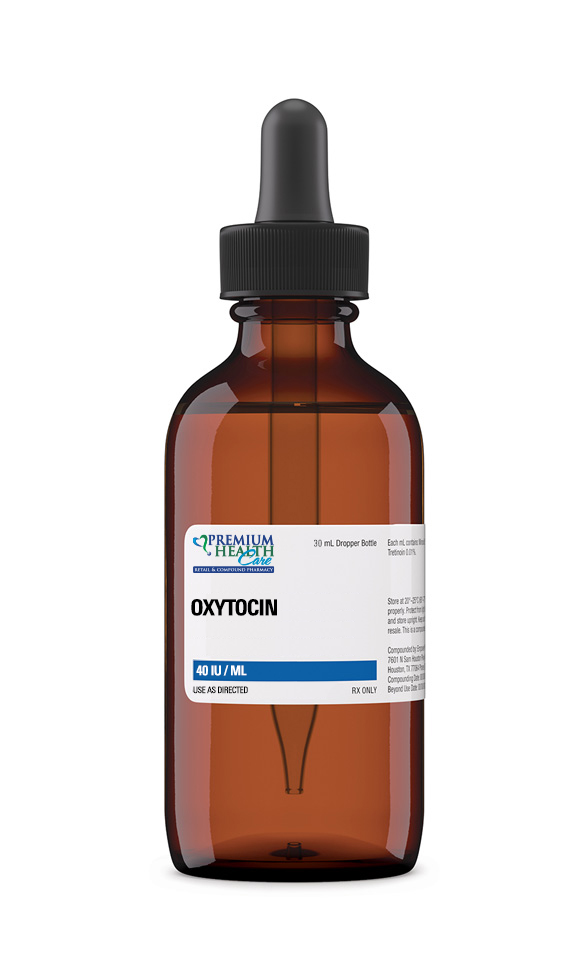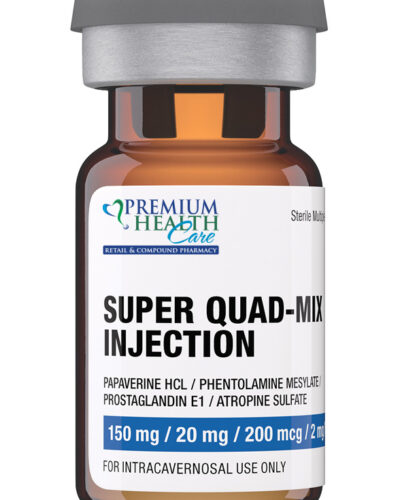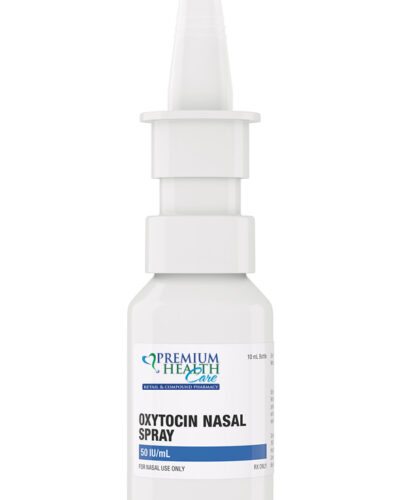Description
(Neuropeptide Formula for Emotional Bonding, Social Connection, and Wellbeing Support)
A Modern Application of the “Bonding Hormone” for Emotional, Cognitive, and Social Support
Oxytocin, often referred to as the “love hormone” or “bonding hormone,” is a naturally occurring neuropeptide best known for its role in emotional regulation, social bonding, and stress reduction. This compounded formulation offers 40 IU/mL strength in a 30 mL dropper bottle, designed for sublingual (under-the-tongue) administration, allowing rapid absorption into the bloodstream.
Oxytocin has gained clinical interest beyond its original obstetric uses for its neuromodulatory effects on mood, social engagement, and trust. It is now used in functional, psychiatric, and wellness practices to support a wide range of emotional and behavioral functions, including anxiety reduction, relationship enhancement, and social cognition in certain neurodiverse populations.
Product Overview
- Active Ingredient: Oxytocin (synthetic)
- Concentration: 40 IU/mL
- Total Volume: 30 mL per bottle (approx. 600–900 drops)
- Form: Sublingual drops (oral mucosal absorption)
- Delivery: Glass dropper bottle
- Administration: Sublingual (under the tongue)
- Storage: Refrigerate at 2–8°C (36–46°F); do not freeze
- Use: Physician-prescribed peptide therapy for emotional and social regulation
What Is Oxytocin?
Oxytocin is a peptide hormone synthesized in the hypothalamus and released by the posterior pituitary. While its classical roles involve uterine contractions and lactation, modern research has uncovered oxytocin’s critical function in the central nervous system, where it influences:
- Emotional attachment and bonding
- Trust and social communication
- Anxiety reduction and emotional buffering
- Empathy and mood stabilization
- Sexual satisfaction and partner connectedness
As a result, oxytocin has become a neurobiological target for therapies aimed at emotional dysregulation, intimacy issues, and certain behavioral health conditions.
Mechanism of Action
When delivered sublingually, oxytocin enters systemic circulation via oral mucosa and exerts its effects by binding to oxytocin receptors (OXTR) found throughout the amygdala, hypothalamus, and brainstem. These receptors modulate:
- Serotonin, dopamine, and GABA signaling
- Cortisol release inhibition, reducing stress response
- Parasympathetic nervous system activation, promoting calm
- Social cue interpretation and trust formation
These properties support oxytocin’s role in psychological safety, emotional resilience, and positive social interaction.
Clinical and Functional Applications
Oxytocin therapy is used across a range of conditions and performance-enhancing protocols:
1. Emotional and Mood Regulation
- Adjunct therapy for anxiety, depression, and post-traumatic stress disorder (PTSD)
- May reduce fear-based responses in emotionally reactive individuals
- Helps reframe emotional context in psychotherapy settings
2. Social Bonding and Relationship Health
- Enhances intimacy and connection between partners
- Improves empathy, eye contact, and communication
- May aid in couples counseling or emotional disengagement
3. Neurodiversity and Behavioral Therapy
- Investigational use in autism spectrum disorder (ASD) to improve social cue processing
- May support social learning in children or adults with social anxiety or attachment challenges
4. Wellness and Longevity Programs
- Used in stress-reduction regimens and biohacking protocols
- Enhances feelings of calm, optimism, and emotional balance
- Can aid sleep onset and parasympathetic regulation
Dosing and Administration
- Typical Dose: 10–20 IU (0.25–0.5 mL) taken sublingually
- Frequency: 1–2 times daily or as directed by provider
- Administration: Hold drops under the tongue for 60 seconds before swallowing
- Adjustment: Dosage may be titrated based on therapeutic effect or tolerability
- Duration: Can be used short-term or in cycles for longer-term goals
Dosing should always be personalized based on clinical response, emotional baseline, and goals of care.
Safety and Tolerability
Oxytocin is generally safe and well tolerated, with minimal systemic side effects.
Potential, mild side effects may include:
- Headache
- Temporary lightheadedness
- Mild nausea
- Rare emotional overstimulation (more common with high doses)
Contraindications are minimal but should be reviewed with a healthcare provider, especially in patients with cardiovascular instability or those taking hormonal or psychiatric medications.
Storage and Handling
- Keep refrigerated at 2–8°C (36–46°F)
- Use within 60 days of opening
- Avoid contamination by keeping dropper tip clean
- Do not shake; protect from direct sunlight
Why Choose Oxytocin Drops?
- Non-invasive, fast-absorbing formulation
- Ideal for daily wellness or therapeutic use
- Precise micro-dosing for emotional regulation
- Used in neuroscience-informed therapy protocols
- Custom-compounded for clinical strength and purity
Summary
Oxytocin – 40 IU/mL Sublingual Drops, 30 mL offers a unique, clinically guided solution for individuals seeking to enhance emotional connection, social engagement, and inner calm. With a well-documented role in bonding, trust, and nervous system regulation, this formulation supports patients and wellness enthusiasts seeking a natural, brain-directed approach to emotional resilience and relationship health.






Reviews
There are no reviews yet.